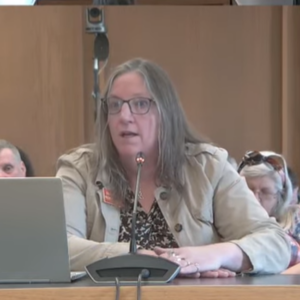Keeping biological males out of girls’ sports would resurrect Jim Crow-era segregation laws.
Forcing teachers to honestly disclose information to parents about their children would rob students of their “safe spaces,” potentially endangering their lives.
Those are just two of the arguments heard from Democrat opponents of legislation before the House Education Committee on Monday.
Both pieces of legislation in question passed the Senate along party lines earlier this month. One would protect girls-only sports teams from biological males claiming to identify as females who want to participate in them. The other requires teachers to give truthful answers to parents who inquire about their children’s behavior at school, including activities related to sex and gender.
Though polls show voters overwhelmingly support both policies, New Hampshire Democrats and their political allies raged against them Monday.
“Even discussing bans like this encourages bigotry and hatred,” Deb Howes, head of New Hampshire’s American Federation Teachers chapter, said in opposition to SB 375, which supports female-only sports teams for public school girls in the sixth grade and beyond. “We should not be going back to any form of separate but not equal.”
Chief sponsor Sen. Tim Lang (R-Sanbornton) introduced both SB 375 and SB 341 – a proposal that would “require all school employees to respond honestly and completely to written requests by parents regarding information relating to their children.”
During debate over biological males participating in girls’ sports, state Rep. Hope Damon (D-Sunapee) denied that biological differences were significant enough to support such a ban.
“The reality is that the primary variable in terms of strength and capacity in any sport is their conditioning and training and wherewithal to play.”
Lang responded by pointing out that “biological sex is the determinant of athletic performance because of the fundamental sex differences in anatomy.”
In fact, the entire premise of the federal government’s Title IX civil rights law is that biological differences are determinative, and therefore, educational institutions that receive federal funding must fund sports scholarships and team positions for women equal to those for men.
Lang argued that allowing males to play on female-only teams, such as basketball, softball, and lacrosse, would result in girls losing roster spots or scholarships.
Rep. Mel Myler (D-Contoocook) dismissed that complaint, saying it only happened on a “fractional” basis.
“That then trumps the volume of trans kids that could participate in sports and learn leadership and teamwork as they have life skills; you’re saying that’s more important than allowing a greater volume of young people to participate in sports rather than just those who might get a scholarship?” he asked.
“The answer is that nothing in this bill stops any students from playing sports,” Lang responded. Under the law, biological males, however they identify, are free to compete on boys’ sports teams.
Chris Erchull, a staff attorney for GLAAD New Hampshire, was called on by Damon to “correct misinformation” in Lang’s testimony. Erchull proceeded by noting that a previous report out of Massachusetts regarding a biological male knocking a female player out of a high school basketball game was overblown because several other players were also injured by other girls.
He also argued that the Massachusetts incident involving a biological male player knocking out the teeth of a girl player during a field hockey game last fall was irrelevant because the offending player wasn’t transgendered.
Erchull then went on to argue why boys should be allowed to ever compete in school sports.
“I ask the committee to inquire as to why — if boys are so dangerous to girls — why aren’t boys so dangerous to other boys that they shouldn’t be allowed to play sports?” Erchull said. “Why is it OK for a boy to be hit in the face with a field hockey ball and lose his teeth if it’s not OK for a girl to?
“I don’t really understand that distinction.”
Neither apparently did Myler.
“I’m not sure why being a biological male should trump what your gender identity is,” Myler said.
Many of the same people who peppered Lang with critical questions regarding SB 375 were also vehemently opposed to mandating that parents be provided truthful answers by teachers when they have questions about their own children.
“Would it be fair to say that this bill would end the confidentiality that students would have with teachers?” Myler asked Lang at one point. Myler never identified where the principle of “teacher-student confidentiality” came from.
“I’ve been clear. Teachers should never keep secrets from parents,” Lang said in response. “I’m amazed that we’re having an argument, that anybody would ever oppose the idea that a teacher should be truthful to a parent.”
State Rep. Loren Selig argued SB 341 would effectively kill off students’ “safe spaces.”
“We need that safe space; children need to have that ability,” she said. “I urge you to oppose this bill because it’s harmful to children.”
State Rep. Timothy Horrigan (D-Durham) mocked concerns parents might have about their children as part of an “anti-trans panic” and offered his own theory about human sexuality.
In the acronym LGBT, Horrigan said, “The ‘B’ stands for bisexual, and everybody is at least somewhat bisexual,” he insisted.
“No straight person is completely straight, no gay person is 100 percent gay, so these issues are difficult for any young person, and this actually isn’t just about issues about sex, gayness, or straightness – it covers just about anything.
“So this makes it essentially impossible for a child to talk about anything confidentially with their teachers or any other adults at the school. It’s a bad idea. It’s just not needed.”
The idea that children should be talking about their sexuality with “teachers and other adults at school” in secret is one reason polls show a majority of voters support the policy, advocates say.




